Charles E W Bean, Diaries, AWM38 3DRL 606/243A/1 - 1916 - 1934 - Part 2
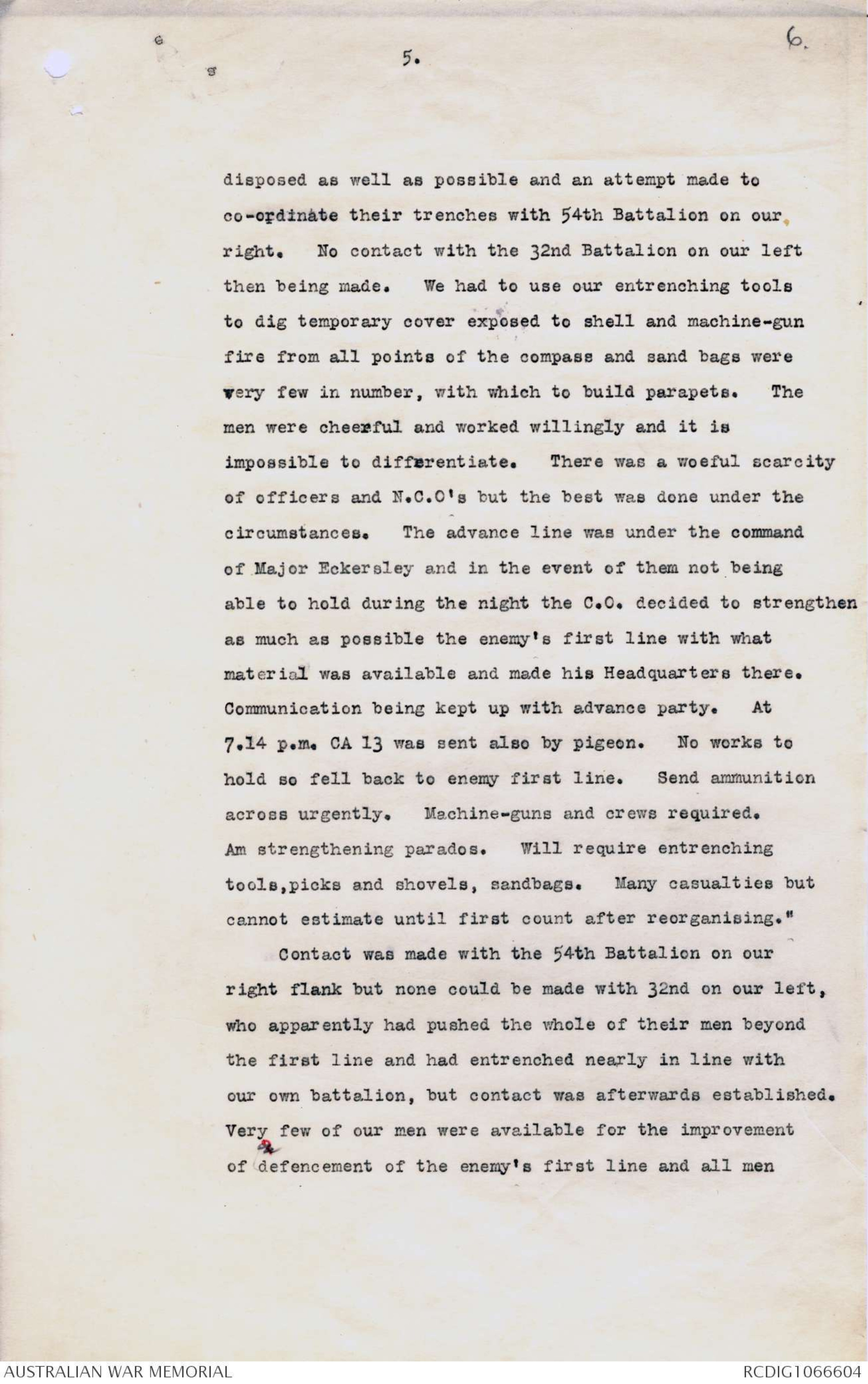
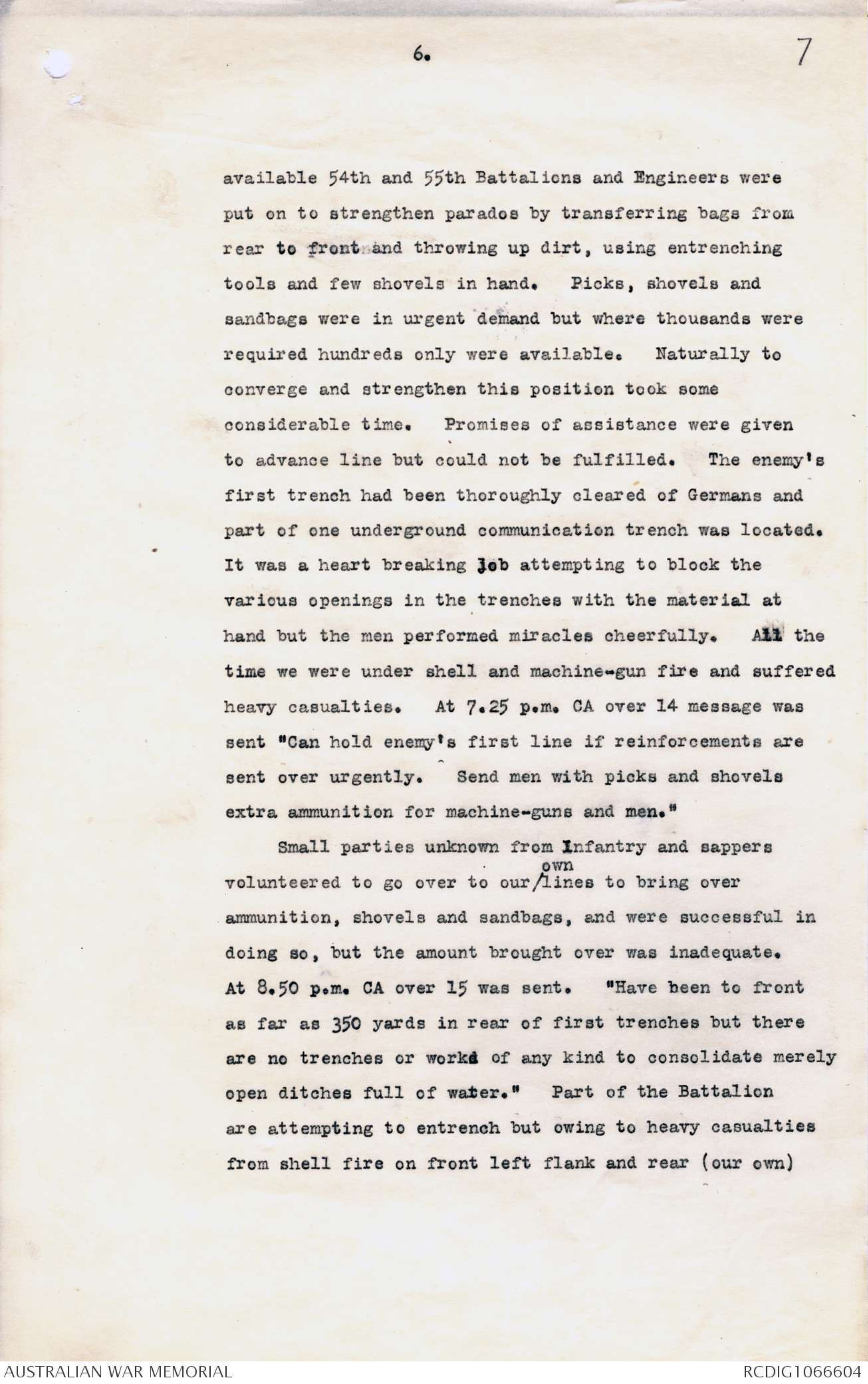
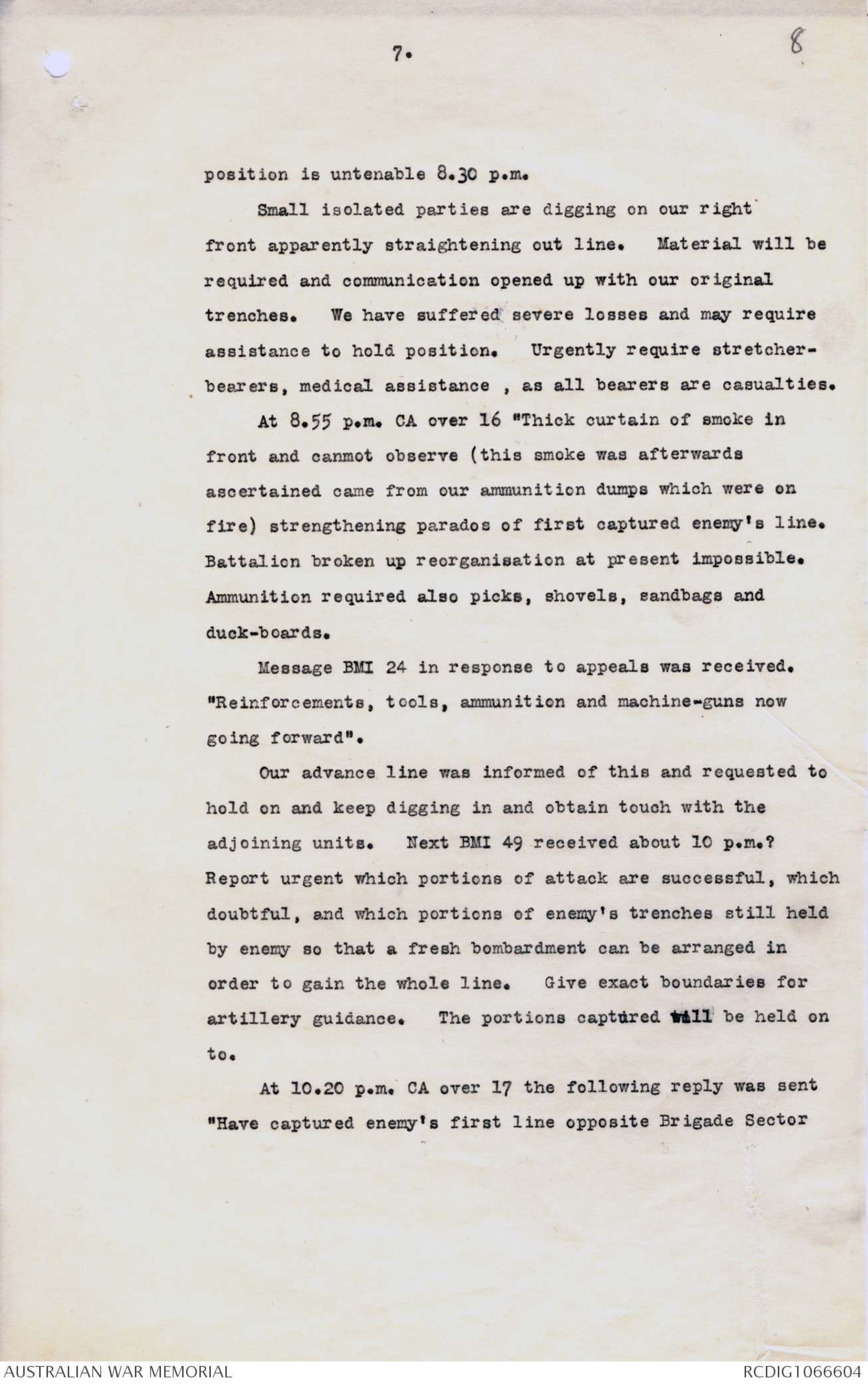
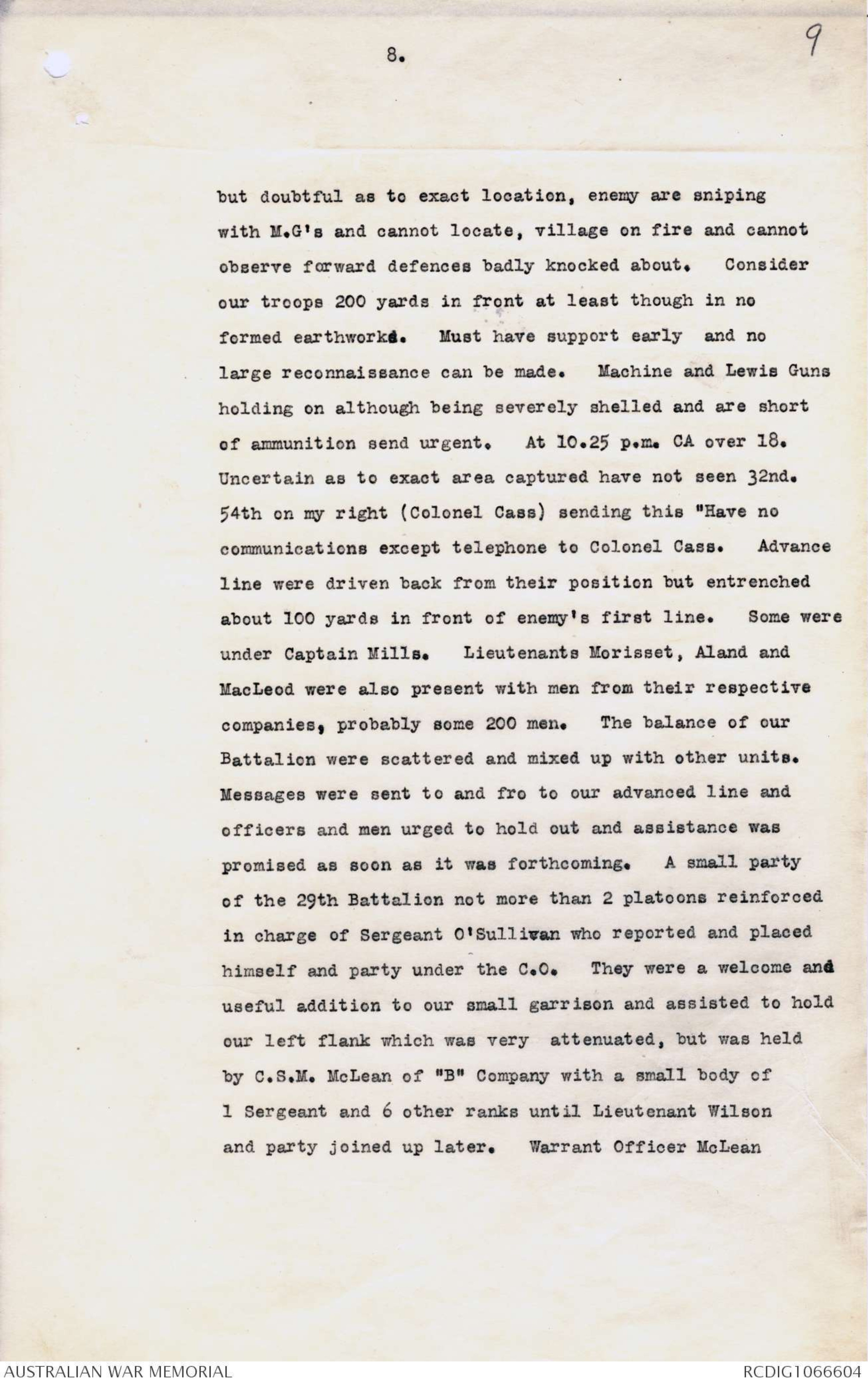
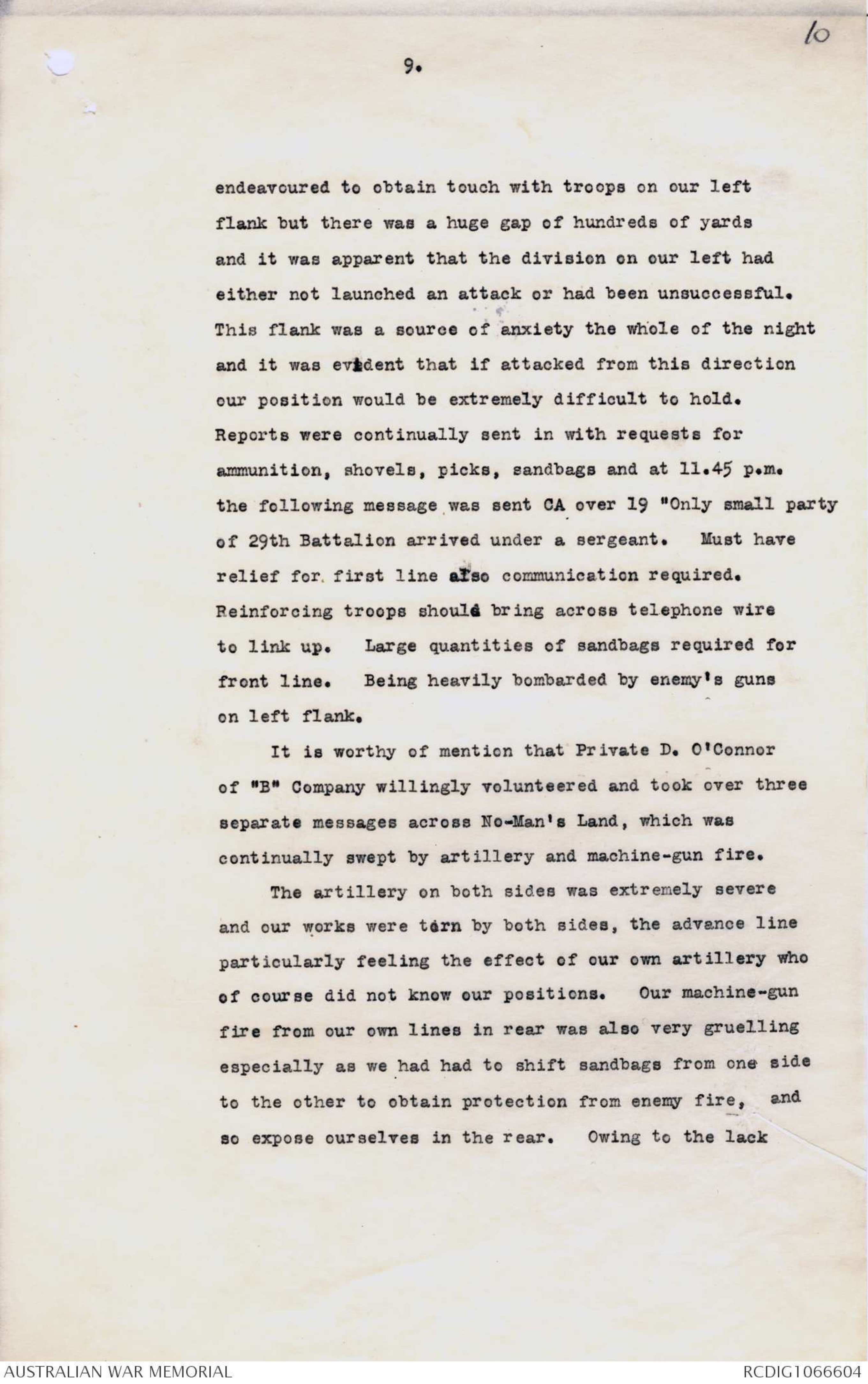
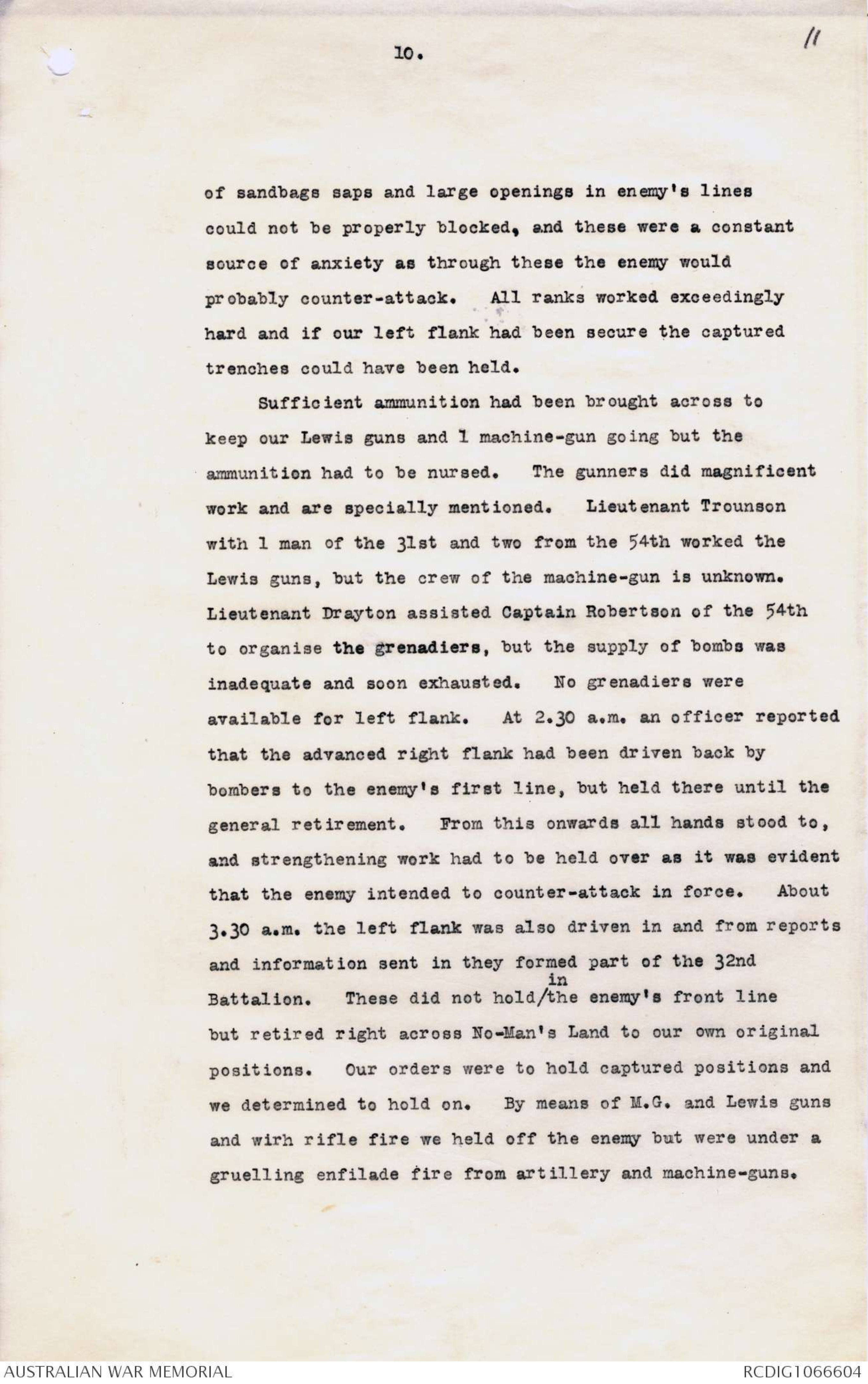
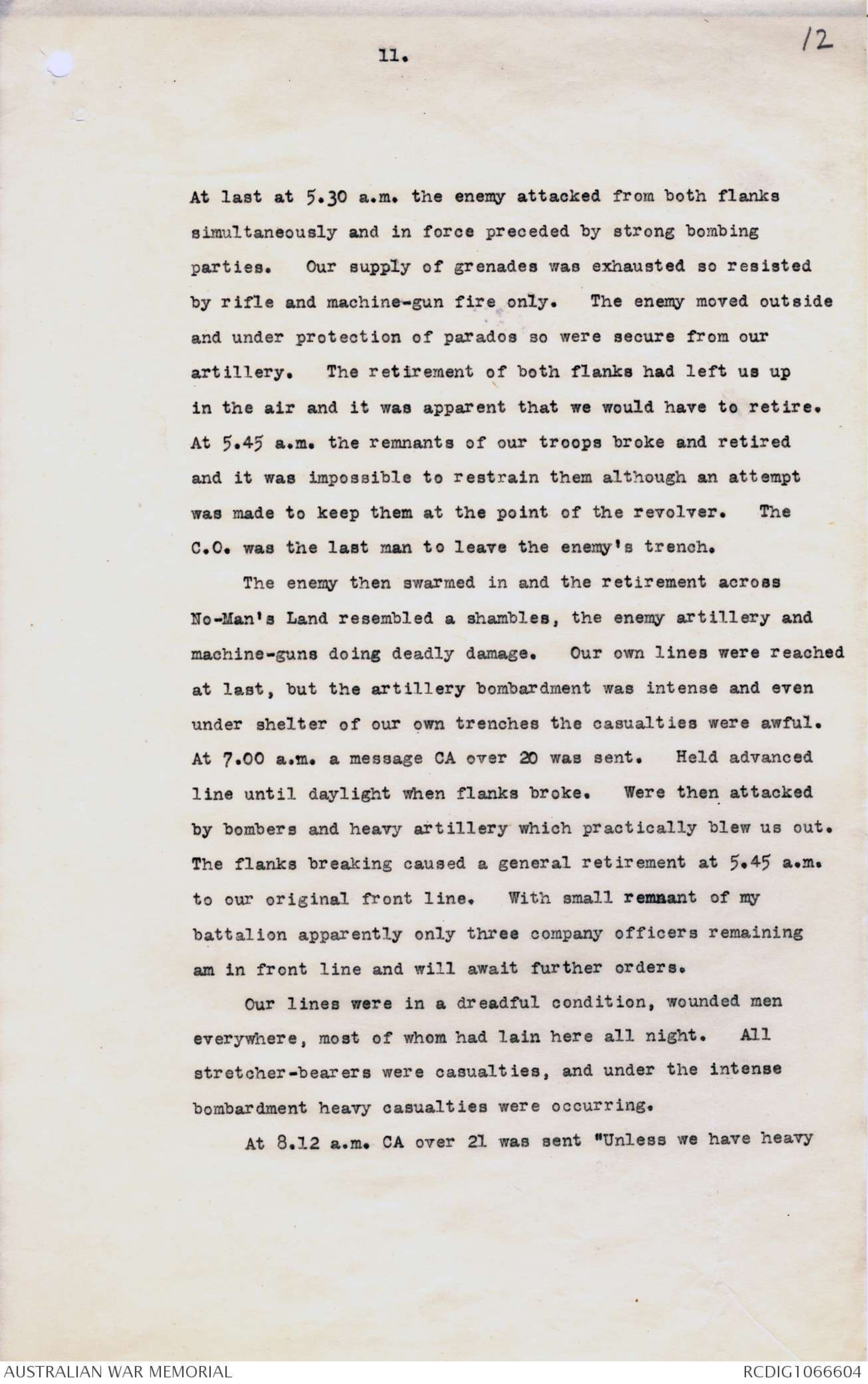
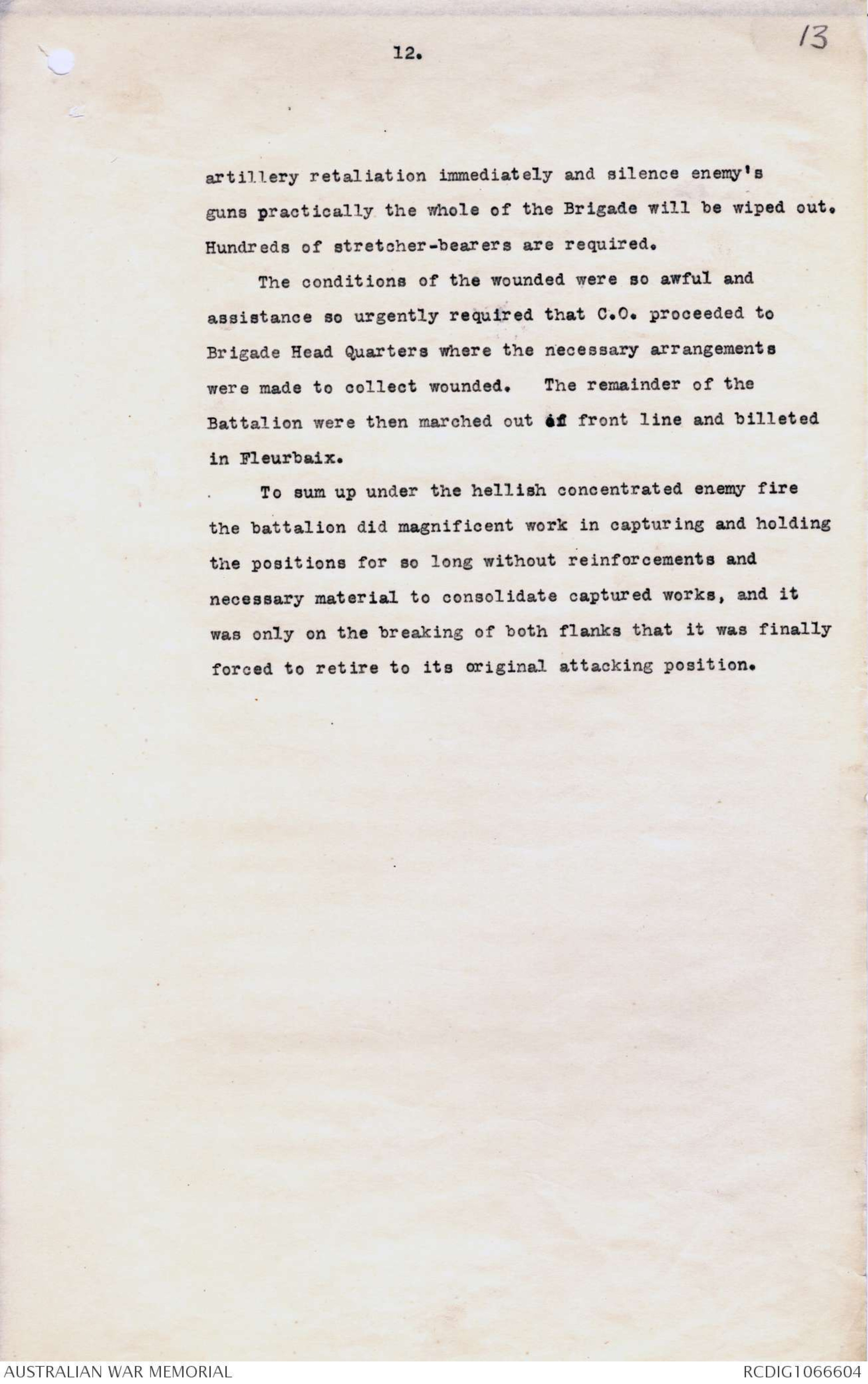
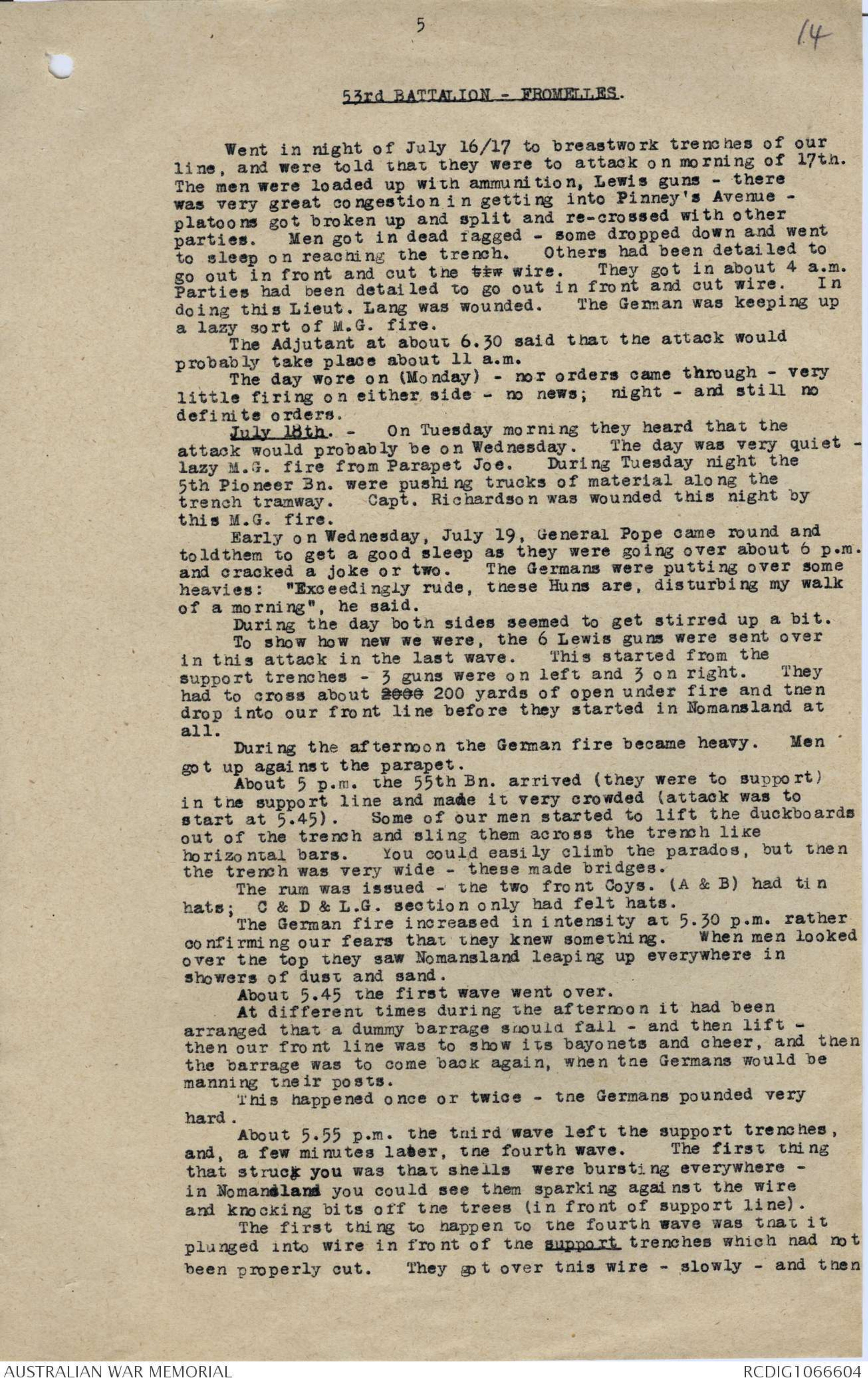
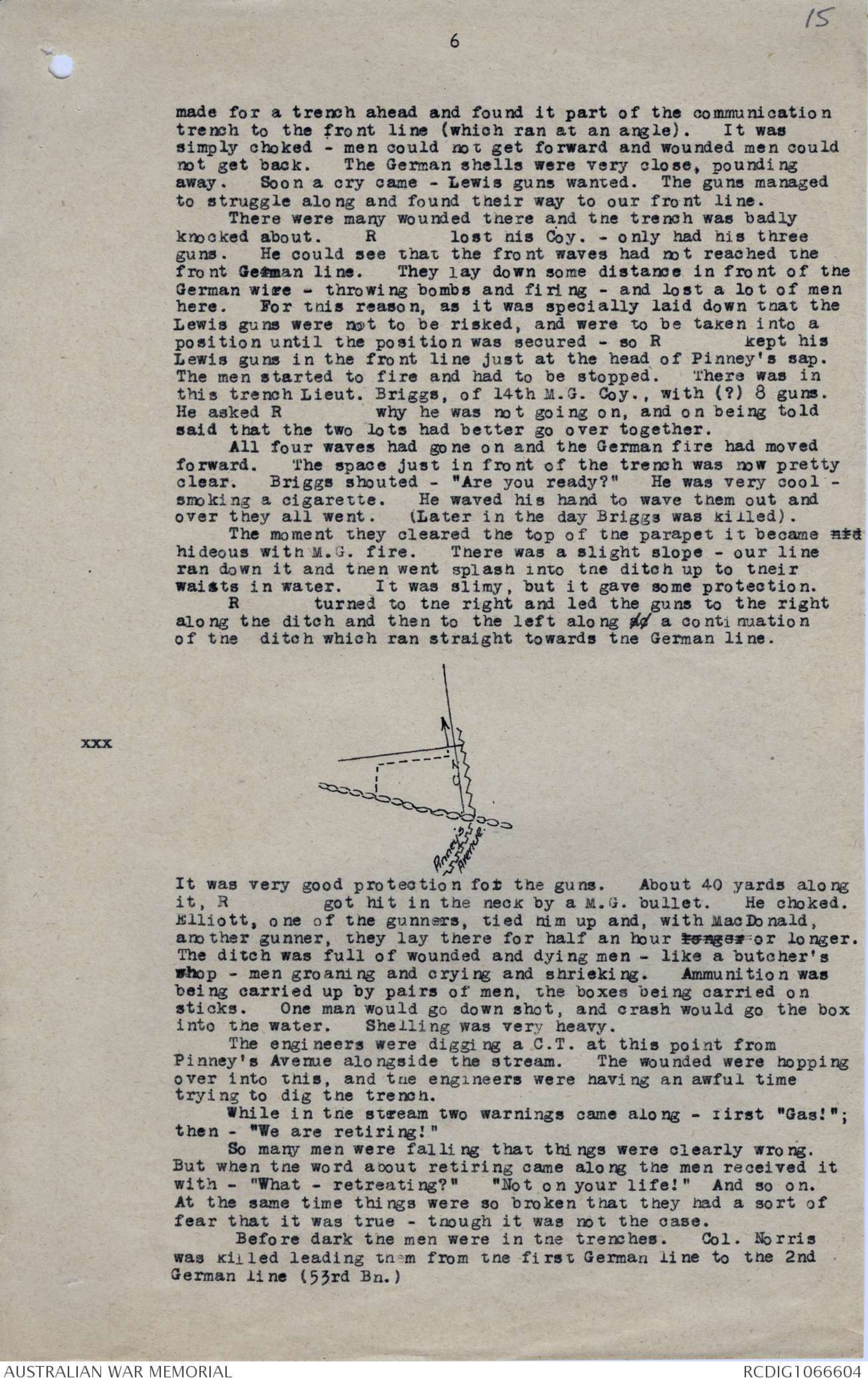
6.
5.
disposed as well as possible and an attempt made to
co-ordinate their trenches with 54th Battalion on our
right. No contact with the 32nd Battalion on our left
then being made. We had to use our entrenching tools
to dig temporary cover exposed to shell and machine-gun
fire from all points of the compass and sand bags were
very few in number, with which to build parapets. The
men were cheerful and worked willingly and it is
impossible to differentiate. There was a woeful scarcity
of officers and N.C.O's but the best was done under the
circumstances. The advance line was under the command
of Major Eckersley and in the event of them not being
able to hold during the night the C.O. decided to strengthen
as much as possible the enemy's first line with what
material was available and made his Headquarters there.
Communication being kept up with advance party. At
7.14 p.m. CA 13 was sent also by pigeon. No works to
hold so fell back to enemy first line. Send ammunition
across urgently. Machine-guns and crews required.
Am strengthening parados. Will require entrenching
tools, picks and shovels, sandbags. Many casualties but
cannot estimate until first count after reorganising."
Contact was made with the 54th Battalion on our
right flank but none could be made with 32nd on our left,
who apparently had pushed the whole of their men beyond
the first line and had entrenched nearly in line with
our own battalion, but contact was afterwards established.
Very few of our men were available for the improvement
of defencement of the enemy's first line and all men
6. 7
available 54th and 55th Battalions and Engineers were
put on to strengthen parados by transferring bags from
rear to front and throwing up dirt, using entrenching
tools and few shovels in hand. Picks, shovels and
sandbags were in urgent demand but where thousands were
required hundreds only were available. Naturally to
converge and strengthen this position took some
considerable time. Promises of assistance were given
to advance line but could not be fulfilled. The enemy's
first trench had been thoroughly cleared of Germans and
part of one underground communication trench was located.
It was a heart breaking job attempting to block the
various openings in the trenches with the material at
hand but the men performed miracles cheerfully. All the
time we were under shell and machine-gun fire and suffered
heavy casualties. At 7.25 p.m. CA over 14 message was
sent "Can hold enemy's first line if reinforcements are
sent over urgently. Send men with picks and shovels
extra ammunition for machine-guns and men."
Small parties unknown from Infantry and sappers
volunteered to go over to our ^own lines to bring over
ammunition, shovels and sandbags, and were successful in
doing so, but the amount brought over was inadequate.
At 8.50 p.m. CA over 15 was sent. "Have been to front
as far as 350 yards in rear of first trenches but there
are no trenches or works of any kind to consolidate merely
open ditches full of water." Part of the Battalion
are attempting to entrench but owing to heavy casualties
from shell fire on front left flank and rear (our own)
7. 8
position is untenable 8.30 p.m.
Small isolated parties are digging on our right
front apparently straightening out line. Material will be
required and communication opened up with our original
trenches. We have suffered severe losses and may require
assistance to hold position. Urgently require stretcher-bearers,
medical assistance, as all bearers are casualties.
At 8.55 p.m. CA over 16 "Thick curtain of smoke in
front and canmot observe (this smoke was afterwards
ascertained came from our ammunition dumps which were on
fire) strengthening parados of first captured enemy's line.
Battalion broken up reorganisation at present impossible.
Ammunition required also picks, shovels, sandbags and
duck-boards.
Message BMI 24 in response to appeals was received.
"Reinforcements, tools, ammunition and machine-guns now
going forward".
Our advance line was informed of this and requested to
hold on and keep digging in and obtain touch with the
adjoining units. Next BMI 49 received about 10 p.m.?
Report urgent which portions of attack are successful, which
doubtful, and which portions of enemy's trenches still held
by enemy so that a fresh bombardment can be arranged in
order to gain the whole line. Give exact boundaries for
artillery guidance. The portions captured will be held on
to.
At 10.20 p.m. CA over 17 the following reply was sent
"Have captured enemy's first line opposite Brigade Sector
8. 9
but doubtful as to exact location, enemy are sniping
with M.G's and cannot locate, village on fire and cannot
observe forward defences badly knocked about. Consider
our troops 200 yards in front at least though in no
formed earthworks. Must have support early and no
large reconnaissance can be made. Machine and Lewis Guns
holding on although being severely shelled and are short
of ammunition send urgent. At 10.25 p.m. CA over 18.
Uncertain as to exact area captured have not seen 32nd.
54th on my right (Colonel Cass) sending this "Have no
communications except telephone to Colonel Cass. Advance
line were driven back from their position but entrenched
about 100 yards in front of enemy's first line. Some were
under Captain Mills. Lieutenants Morisset, Aland and
MacLeod were also present with men from their respective
companies, probably some 200 men. The balance of our
Battalion were scattered and mixed up with other units.
Messages were sent to and fro to our advanced line and
officers and men urged to hold out and assistance was
promised as soon as it was forthcoming. A small party
of the 29th Battalion not more than 2 platoons reinforced
in charge of Sergeant O'Sullivan who reported and placed
himself and party under the C.O. They were a welcome and
useful addition to our small garrison and assisted to hold
our left flank which was very attenuated, but was held
by C.S.M. McLean of "B" Company with a small body of
1 Sergeant and 6 other ranks until Lieutenant Wilson
and party joined up later. Warrant Officer McLean
10
9.
endeavoured to obtain touch with troops on our left
flank but there was a huge gap of hundreds of yards
and it was apparent that the division on our left had
either not launched an attack or had been unsuccessful.
This flank was a source of anxiety the whole of the night
and it was evident that if attacked from this direction
our position would be extremely difficult to hold.
Reports were continually sent in with requests for
ammunition, shovels, picks, sandbags and at 11.45 p.m.
the following message was sent CA over 19 "Only small party
of 29th Battalion arrived under a sergeant. Must have
relief for first line also communication required.
Reinforcing troops should bring across telephone wire
to link up. Large quantities of sandbags required for
front line. Being heavily bombarded by enemy's guns
on left flank.
It is worthy of mention that Private D. O'Connor
of "B" Company willingly volunteered and took over three
separate messages across No-Man's Land, which was
continually swept by artillery and machine-gun fire.
The artillery on both sides was extremely severe
and our works were torn by both sides, the advance line
particularly feeling the effect of our own artillery who
of course did not know our positions. Our machine-gun
fire from our own lines in rear was also very gruelling
especially as we had had to shift sandbags from one side
to the other to obtain protection from enemy fire, and
so expose ourselves in the rear. Owing to the lack
10. 11
of sandbags saps and large openings in enemy's lines
could not be properly blocked, and these were a constant
source of anxiety as through these the enemy would
probably counter-attack. All ranks worked exceedingly
hard and if our left flank had been secure the captured
trenches could have been held.
Sufficient ammunition had been brought across to
keep our Lewis guns and 1 machine-gun going but the
ammunition had to be nursed. The gunners did magnificent
work and are specially mentioned. Lieutenant Trounson
with 1 man of the 31st and two from the 54th worked the
Lewis guns, but the crew of the machine-gun is unknown.
Lieutenant Drayton assisted Captain Robertson of the 54th
to organise the grenadiers, but the supply of bombs was
inadequate and soon exhausted. No grenadiers were
available for left flank. At 2.30 a.m. an officer reported
that the advanced right flank had been driven back by
bombers to the enemy's first line, but held there until the
general retirement. From this onwards all hands stood to,
and strengthening work had to be held over as it was evident
that the enemy intended to counter-attack in force. About
3.30 a.m. the left flank was also driven in and from reports
and information sent in they formed part of the 32nd
Battalion. These did not hold ^in the enemy's front line
but retired right across No-Man's Land to our own original
positions. Our orders were to hold captured positions and
we determined to hold on. By means of M.G. and Lewis guns
and wirh rifle fire we held off the enemy but were under a
gruelling enfilade fire from artillery and machine-guns.
12
11.
At last at 5.30 a.m. the enemy attacked from both flanks
simultaneously and in force preceded by strong bombing
parties. Our supply of grenades was exhausted so resisted
by rifle and machine-gun fire only. The enemy moved outside
and under protection of parados so were secure from our
artillery. The retirement of both flanks had left us up
in the air and it was apparent that we would have to retire.
At 5.45 a.m. the remnants of our troops broke and retired
and it was impossible to restrain them although an attempt
was made to keep them at the point of the revolver. The
C.O. was the last man to leave the enemy's trench.
The enemy then swarmed in and the retirement across
No-Man's Land resembled a shambles, the enemy artillery and
machine-guns doing deadly damage. Our own lines were reached
at last, but the artillery bombardment was intense and even
under shelter of our own trenches the casualties were awful.
At 7.00 a.m. a message CA over 20 was sent. Held advanced
line until daylight when flanks broke. Were then attacked
by bombers and heavy artillery which practically blew us out.
The flanks breaking caused a general retirement at 5.45 a.m.
to our original front line. With small remnant of my
battalion apparently only three company officers remaining
am in front line and will await further orders.
Our lines were in a dreadful condition, wounded men
everywhere, most of whom had lain here all night. All
stretcher-bearers were casualties, and under the intense
bombardment heavy casualties were occurring.
At 8.12 a.m. CA over 21 was sent "Unless we have heavy
13
12.
artillery retaliation immediately and silence enemy's
guns practically the whole of the Brigade will be wiped out.
Hundreds of stretcher-bearers are required.
The conditions of the wounded were so awful and
assistance so urgently required that C.O. proceeded to
Brigade Head Quarters where the necessary arrangements
were made to collect wounded. The remainder of the
Battalion were then marched out of front line and billeted
in Fleurbaix.
To sum up under the hellish concentrated enemy fire
the battalion did magnificent work in capturing and holding
the positions for so long without reinforcements and
necessary material to consolidate captured works, and it
was only on the breaking of both flanks that it was finally
forced to retire to its original attacking position.
5
14
53rd BATTALION - FROMELLES.
Went in night of July 16/17 to breastwork trenches of our
line, and were told that they were to attack on morning of 17th.
The men were loaded up with ammunition, Lewis guns - there
was very great congestion in getting into Pinney's Avenue -
platoons got broken up and split and re-crossed with other
parties. Men got in dead fagged - some dropped down and went
to sleep on reaching the trench. Others had been detailed to
go out in front and cut the tiw wire. They got in about 4 a.m.
Parties had been detailed to go out in front and cut wire. In
doing this Lieut. Lang was wounded. The German was keeping up
a lazy sort of M.G. fire.
The Adjutant at about 6.30 said that the attack would
probably take place about 11 a.m.
The day wore on (Monday) - nor orders came through - very
little firing on either side - no news; night - and still no
definite orders.
July 18th.- On Tuesday morning they heard that the
attack would probably be on Wednesday. The day was very quiet -
lazy M.G. fire from Parapet Joe. During Tuesday night the
5th Pioneer Bn. were pushing trucks of material along the
trench tramway. Capt. Richardson was wounded this night by
this M.G. fire.
Early on Wednesday, July 19, General Pope came round and
toldthem to get a good sleep as they were going over about 6 p.m.
and cracked a joke or two. The Germans were putting over some
heavies: "Exceedingly rude, these Huns are, disturbing my walk
of a morning", he said.
During the day both sides seemed to get stirred up a bit.
To show how new we were, the 6 Lewis guns were sent over
in this attack in the last wave. This started from the
support trenches - 3 guns were on left and 3 on right. They
had to cross about 2000 200 yards of open under fire and then
drop into our front line before they started in Nomansland at
all.
During the afternoon the German fire became heavy. Men
got up against the parapet.
About 5 p.m. the 55th Bn. arrived (they were to support)
in the support line and made it very crowded (attack was to
start at 5.45). Some of our men started to lift the duckboards
out of the trench and sling them across the trench like
horizontal bars. You could easily climb the parados, but then
the trench was very wide - these made bridges.
The rum was issued - the two front Coys. (A & B) had tin
hats; C & D & L.G. section only had felt hats.
The German fire increased in intensity at 5.30 p.m. rather
confirming our fears that they knew something. When men looked
over the top they saw Nomansland leaping up everywhere in
showers of dust and sand.
About 5.45 the first wave went over.
At different times during the afternoon it had been
arranged that a dummy barrage should fall - and then lift -
then our front line was to show its bayonets and cheer, and then
the barrage was to come back again, when the Germans would be
manning their posts.
This happened once or twice - the Germans pounded very
hard.
About 5.55 p.m. the third wave left the support trenches,
and, a few minutes later, the fourth wave. The first thing
that struck you was that shells were bursting everywhere -
in Nomansland you could see them sparking against the wire
and knocking bits off the trees (in front of support line).
The first thing to happen to the fourth wave was that it
plunged into wire in front of the support trenches which had not
been properly cut. They got over this wire - slowly - and then
15
6
made for a trench ahead and found it part of the communication
trench to the front line (which ran at an angle). It was
simply choked - men could not get forward and wounded men could
not get back. The German shells were very close, pounding
away. Soon a cry came - Lewis guns wanted. The guns managed
to struggle along and found their way to our front line.
There were many wounded there and the trench was badly
knocked about. R lost his Coy. - only had his three
guns. He could see that the front waves had not reached the
front German line. They lay down some distance in front of the
German wire - throwing bombs and firing - and lost a lot of men
here. For this reason, as it was specially laid down that the
Lewis guns were not to be risked, and were to be taken into a
position until the position was secured - so R kept his
Lewis guns in the front line just at the head of Pinney's sap.
The men started to fire and had to be stopped. There was in
this trench Lieut. Briggs, of 14th M.G. Coy., with (?) 8 guns.
He asked R why he was not going on, and on being told
said that the two lots had better go over together.
All four waves had gone on and the German fire had moved
forward. The space just in front of the trench was now pretty
clear. Briggs shouted - "Are you ready?" He was very cool -
smoking a cigarette. He waved his hand to wave them out and
over they all went. (Later in the day Briggs was killed).
The moment they cleared the top of the parapet it became hid
hideous with M.G. fire. There was a slight slope - our line
ran down it and then went splash into the ditch up to their
waists in water. It was slimy, but it gave some protection.
R turned to the right and led the guns to the right
along the ditch and then to the left along ac a continuation
of the ditch which ran straight towards the German line.
xxx Diagram - see original document
It was very good protection for the guns. About 40 yards along
it, R got hit in the neck by a M.G. bullet. He choked.
Elliott, one of the gunners, tied him up and, with MacDonald,
another gunner, they lay there for half an hour longer or longer.
The ditch was full of wounded and dying men - like a butcher's
shop - men groaning and crying and shrieking. Ammunition was
being carried up by pairs of men, the boxes being carried on
sticks. One man would go down shot, and crash would go the box
into the water. Shelling was very heavy.
The engineers were digging a C.T. at this point from
Pinney's Avenue alongside the stream. The wounded were hopping
over into this, and the engineers were having an awful time
trying to dig the trench.
While in the stream two warnings came along - first "Gas!";
then - "We are retiring!"
So many men were falling that things were clearly wrong.
But when the word about retiring came along the men received it
with - "What - retreating?" "Not on your life!" And so on.
At the same time things were so broken that they had a sort of
fear that it was true - though it was not the case.
Before dark the men were in the trenches. Col. Norris
was killed leading them from the first German line to the 2nd
German line (53rd Bn.)
 Maria Okon
Maria OkonThis transcription item is now locked to you for editing. To release the lock either Save your changes or Cancel.
This lock will be automatically released after 60 minutes of inactivity.